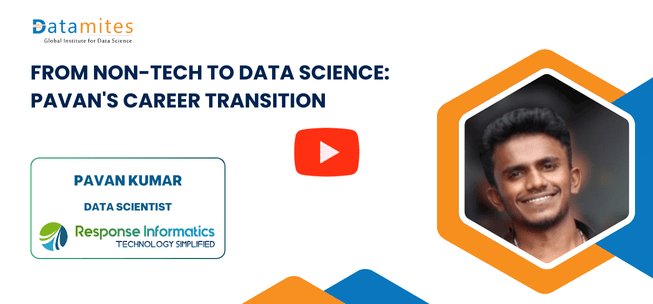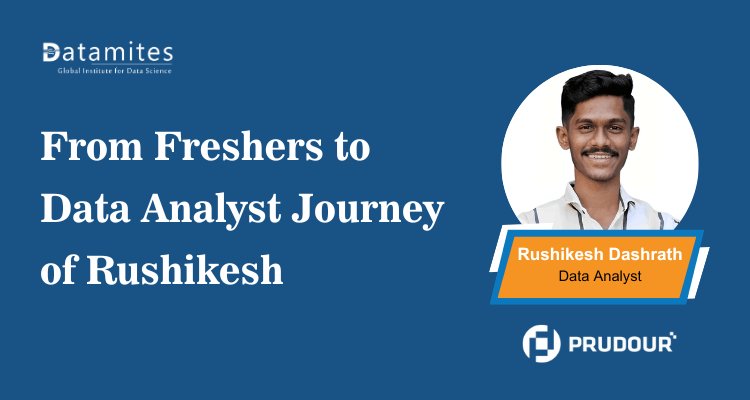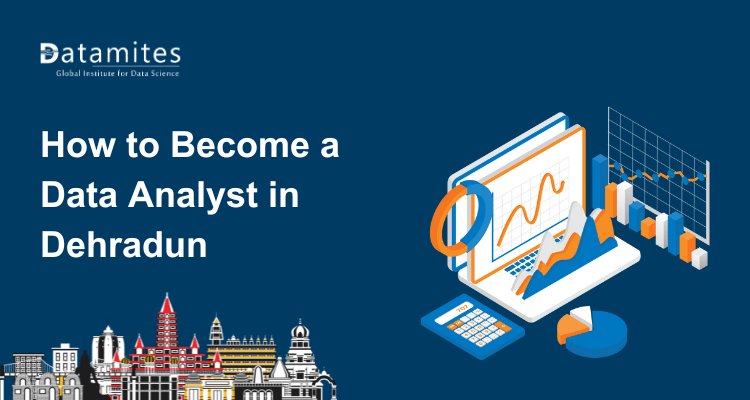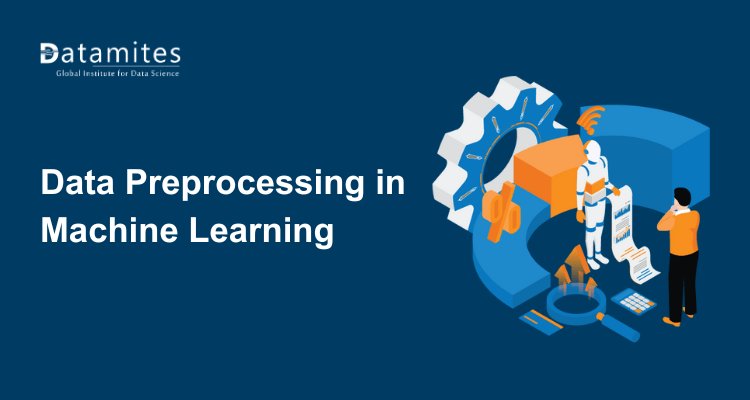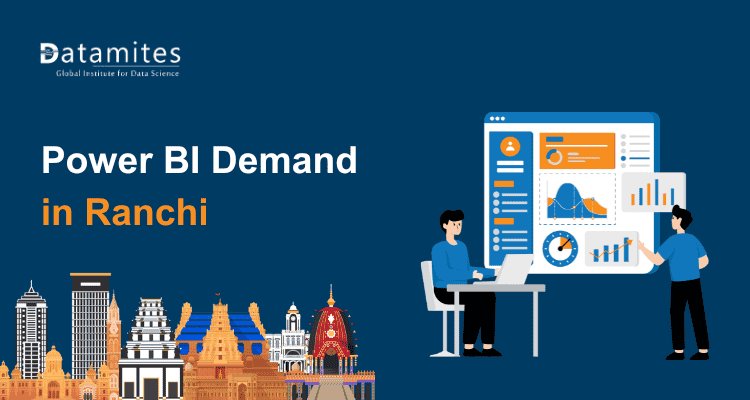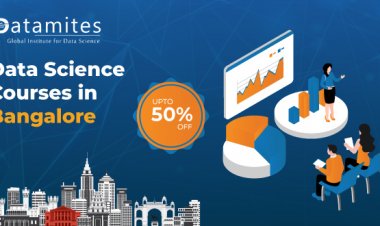From Non-Tech to Data Science: Pavan's Career Transition
Discover how Pavan successfully transitioned from a non-technical background to a thriving career in data science. His journey highlights the power of upskilling, determination, and the right guidance.
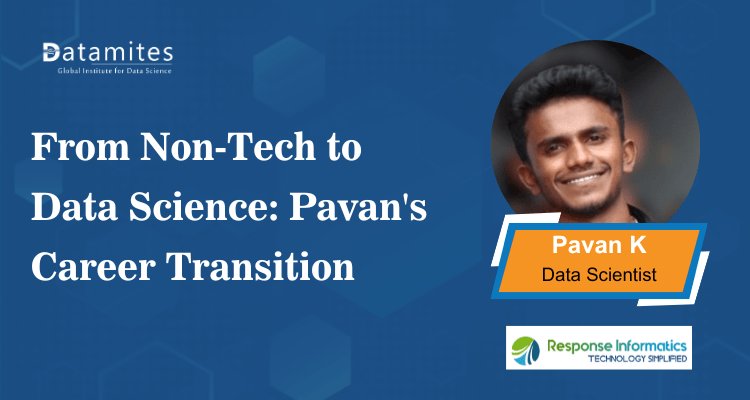
In the rapidly evolving world of technology, transitioning into the IT industry from a non-technical background may seem daunting. But with the right mindset, consistent effort, and proper guidance, such a shift is not only possible but also rewarding. Pavan's journey is a testament to this. Coming from a non-technical background, he successfully transitioned into a data science role, thanks to his unwavering dedication and the structured support from DataMites. In this blog, we delve into his story, exploring the challenges he faced, how he overcame them, and his advice to aspiring data professionals.
Pavan's Career Shift to Data Science: A Tale of Growth with DataMites
We will explore Pavan's inspiring journey into data science, where he shares his experiences, challenges, and key learnings from his transition with the help of DataMites. Below are the answers to some frequently asked questions about his career shift.
Q1: Can you tell us a bit about your background and how you got into data science?
I come from a non-technical background, having graduated with a Bachelor of Business Administration (BBA) in September 2022. Initially, I had no experience in programming or analytics—I had never even touched Python or any other programming language before. At first, I considered pursuing an MBA, but as I reflected on my future, I realized I was looking for something more exciting and forward-looking. That's when I started exploring opportunities in the IT field.
Data science stood out to me as a field that seemed accessible, even for someone without a technical background. With the help of DataMites Institute, I began learning from scratch, starting with the basics, and gradually built up my knowledge. Today, I'm proud to say that I’m now working in a data science role, and it has been an incredibly rewarding transition.
Q2: What inspired you to move from a non-technical field to data science?
I’ve always been curious about how data can drive decisions and how algorithms work. The more I learned about machine learning, artificial intelligence, and data science, the more fascinated I became. The ability to use data to solve complex problems really drew me in, so I decided to make this career transition.
Q3: How did you start preparing for your career in data science?
I started with learning theoretical concepts first. I focused on understanding the basics of programming, data structures, algorithms, and statistics. Once I got a good grasp of the theory, I began working on practical projects like chatbots. The practical experience allowed me to grasp how to implement the concepts in real-world situations.
Q4: What challenges did you face during this transition, and how did you overcome them?
The biggest challenge was the initial lack of technical knowledge. Everything from basic programming logic to advanced concepts like machine learning was new to me. I began by focusing on theory and gradually started applying what I learned through hands-on projects. I dedicated around 4-5 hours every day outside office hours to practice and learn, which really made a difference.
Q5: What topics are you currently focusing on for your upcoming projects?
Right now, I'm focusing on SDLC (Software Development Life Cycle) and Agile methodology. These concepts are essential for upcoming projects, and I’m also gaining practical experience by working on chatbots and similar projects. I started with theoretical learning and am now enjoying the practical implementation.
Q6: How do you manage your time to balance learning and work?
Time management has been crucial. I make sure to spend 4 to 5 hours daily outside my work hours learning and practicing. I’ve been very punctual and have developed a routine that helps me stay on track. It's all about consistency and setting clear goals.
Q7: How many mock interviews have you attended as part of your preparation?
I have attended multiple mock interviews as part of the DataMites placement phase. These sessions helped me understand how real interviews work and improved both my technical and communication skills.
Q8: How did DataMites assist you in your transition to data science?
DataMites provided me with a structured curriculum that covered all the important topics in data science. They not only focused on theoretical concepts but also emphasized practical learning through hands-on projects. The mock interviews, career counseling, and exposure to real-world tools and techniques made a huge difference in preparing me for interviews and the job market. Thanks to their support and guidance, I successfully got placed as a Data Scientist at Response Informatics.
Q9: Any tips on how to crack data science interviews?
Yes! Communication is key. Even if your answer isn't perfect, presenting it confidently can leave a good impression. Apart from that, invest time in understanding the fundamentals of data science and programming. Practice writing code, building logic, and solving real-world problems. Hard work and clarity will surely help you succeed.
Q10: What was your interview experience like for the data scientist role?
The interview was focused heavily on machine learning concepts. They asked about different algorithms, their use cases, and how to apply them. In addition to machine learning, having a fair understanding of deep learning helped me answer a few advanced questions.
Q11: Would you say deep learning is necessary for data science roles?
While it may not be essential at the beginner level, having intermediate knowledge of deep learning concepts can definitely add value. It demonstrates your readiness for more advanced challenges and provides you with a competitive advantage.
Q12: What role do statistics play in data science, and how did you approach mastering this subject?
Statistics is the foundation of data science. It helps in understanding data distribution, model evaluation, and hypothesis testing. To master statistics, I focused on understanding the core concepts such as probability, distributions, and statistical tests. I practiced applying statistical methods to real-world datasets, which helped me understand their importance in data science workflows.
Q13: What advice would you give to someone starting their data science journey from scratch?
Start with the basics—learn programming languages like Python and understand the fundamentals of statistics and data analysis. Then, gradually progress to machine learning and deep learning. Staying consistent is essential, so make sure to set aside regular time for studying. Don’t rush—take one step at a time and focus on applying what you learn through projects.
Q14: What was the most valuable lesson you learned from your journey into data science?
The most important lesson I learned was the value of persistence. The journey was not easy, but consistency paid off. Even when faced with challenges, I learned to stay focused, keep going, and look for solutions. It’s also essential to keep learning and evolving—data science is a fast-paced field, and staying updated is crucial.
Q15: What are your future plans in the data science field?
I plan to continue deepening my knowledge of deep learning and reinforcement learning. I also want to work on deploying machine learning models into production environments and contributing to open-source projects. My goal is to keep learning and working on impactful data science projects that make a real difference.
Refer these articles:
- Shivaji's Transition from Mechanical Engineering to Data Science
- Manohar’s Journey: From Mechanical Engineer to Data Scientist
- Partha’s Data Science Journey: From Beginner to Data Scientist
Key Takeaways from Pavan’s Data Science Journey
Pavan's journey from a non-technical background to a successful data science career offers valuable insights for anyone looking to make a similar transition. Here are the main insights from his experience:
- Non-Technical Background: Pavan transitioned from a non-technical background with no prior coding experience, highlighting that anyone can shift into data science with determination and the right resources.
- Bachelor's in Business Administration: Pavan graduated with a Bachelor of Business Administration in 2022, initially considering an MBA but ultimately choosing to pursue a career in IT for more future-focused opportunities.
- Initial Lack of Programming Knowledge: He had no experience with programming languages like Python before starting his journey into data science.
- Exploration of Data Science: Realizing the potential of the IT field, Pavan identified data science as an accessible entry point for non-technical individuals, which led him to begin his career transition.
- Learning from Scratch: With the support of DataMites, Pavan learned the fundamentals of data science from scratch, starting with basic concepts before building on them gradually.
- Hands-on Projects: Pavan's hands-on experience, including working on projects like chatbots, helped him apply theoretical knowledge to practical scenarios, further enhancing his skills.
- Commitment to Learning: He dedicated 4-5 hours daily, outside of office hours, to learning new concepts and preparing for upcoming projects, demonstrating a strong commitment to self-improvement.
- Time Management Skills: Pavan effectively managed his time, balancing learning with practical work, ensuring he made steady progress in his transition into data science.
- Support from DataMites: DataMites played a crucial role in Pavan's transition by providing him with structured learning resources, which made the complex field of data science more understandable.
- Growth in Communication Skills: Throughout his journey, Pavan recognized that strong communication skills are vital in interviews and in the workplace, as they leave a lasting impression on others.
- Focus on Machine Learning: During his job interviews, Pavan emphasized the importance of learning machine learning techniques and algorithms, with an added focus on deep learning for advanced roles.
- Importance of Practical Knowledge: Pavan's experience underscores the importance of hands-on practice in mastering technical concepts like machine learning and data science.
- Success Story of Career Transition: His story serves as an inspiring example of how individuals can successfully transition into data science roles from non-technical backgrounds with determination and the right resources.
- Continual Improvement: Pavan's ongoing dedication to learning, even after securing a job in data science, showcases the importance of continual learning in a rapidly evolving field.
- Encouragement for Others: Pavan encourages others considering a similar career transition to stay focused, dedicate time to learning, and embrace new opportunities in the tech field, particularly data science.
Pavan’s story is an inspiration to anyone considering a career change into the tech industry. With hard work, persistence, and the right guidance, he was able to transform his career and move from a non-technical background to a data science role. His journey shows that with the right mindset, tools, and support, anyone can successfully transition into this exciting and dynamic field.
Refer these articles:
- Why Data Scientist Career in Bangalore
- Why Data Scientist Career in Hyderabad
- Why Data Scientist Career in Pune
If you're considering a career shift into data science, now is the perfect time to upskill. A report by Grand View Research reveals that the global data science platform market, valued at USD 96.25 billion in 2023, is expected to grow at a CAGR of 26.0% from 2024 to 2030, driven by the surge in data generated by digital activities. To stay competitive in this fast-growing field, it’s essential to choose a training institute offering hands-on experience, internships, and robust placement support. Top data science offline courses in Hyderabad, Bangalore, Chennai, Pune, Mumbai, Delhi, and Ahmedabad, making it easier than ever to begin your journey in this field.
DataMites Institute stands out as a premier training provider specializing in Data Science, AI, Machine Learning, Python Development, and Data Analytics. Recognized among India’s Top 20 AI Institutes by Analytics India Magazine (AIM), DataMites is highly regarded alongside IIT and IIM for delivering exceptional training in these fields. Accredited by IABAC and NASSCOM FutureSkills, DataMites offers expert-led training, real-world projects, and comprehensive placement support, ensuring learners transition smoothly into successful data science careers.
With both offline Data Science training in Bangalore, Hyderabad, Chennai, Pune, Ahmedabad, Coimbatore, and Mumbai, as well as online learning options, DataMites provides hands-on experience and industry-relevant skills. Whether you’re a fresh graduate, a working professional, or someone considering a career change, DataMites offers a well-structured and effective path into Data Science, AI, and Machine Learning.
For those looking to follow in his footsteps, Pavan’s advice is clear: stay dedicated, continuously invest time in learning, and always strive for improvement. Whether you're starting with minimal technical knowledge or looking to deepen your expertise, there’s always room for growth in data science.
